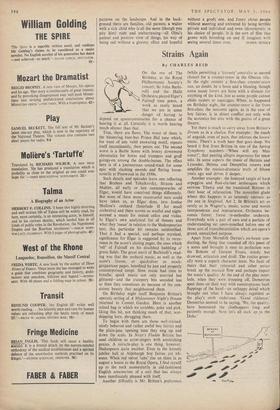Strains Again
By CHARLES REID True, there are flaws. The worst of them is the blustering four-bar Prince Hal tune which, for want of any valid answering motif, repeats itself incontinently, then peters out. The second worst is a. Battle Scene with breezy downward chromatics for horns and trumpets and gruff goings-on among the double-basses. The effect here is of a journeyman sound-track for some epic with clashing swords and flaring horse- nostrils at Pinewood in the 1930s.
Such details and episodes leave one reflecting that Brahms and. Tohaikovsky, Strauss and Mahler, all early or late contemporaries of Elgar, would have contrived things differently. But none of these more resourceful men could have taken us, as Elgar does, into Justice Shallow's orchard (Interlude II for small orchestra) and there woven so wistful and night- scented a music for muted cellos and violas. In Elgar's own analytical list of themes and what they 'mean' in relation to the Shakespearian text, this particular bit remains unidentified. That it had a special, and perhaps mystical, significance for Elgar is suggested by its recur- rence in the_score's closing pages, the ones which 'tell' of Falstaff on his deathbed babbling o' green fields. The great merit of Barbirolli's read- ing was that the orchard music, as well as the score's lissom, or quicksilver or mock- gargantuan pages, benefited by just and properly counterpoised tempi. Slow music had time to breathe, quick music not only scurried but glittered—and the trumpery bits sounded less so than they •sometimes do because of the con- sistent beauty that neighboured them.
On Birthday night itself Benjamin Britten's operatic setting of A Midsummer Night's Dream returned to Covent Garden. Here is another mixed bag in which we scrabble, poke and pick, liking this bit, not thinking much of that, wor- shipping here, shrugging there.
To begin with there are those well-trained, nicely behaved- and rather awful boy fairies and the plain-jane opening tune they sing up and down the scale. In Noye's Fludde Britten has used children as actor-singers with astonishing genius. A miracle-play is one thing, however; Shakespeare quite another. Even in the homely jubilee hall at Aldeburgh boy fairies are irk- some. When red velvet 'tabs' rise on them in as august a house as the Royal Opera, I find myself up to the neck momentarily in old-fashioned English amateurism of a sort that has always been inordinately pleased with itself.
Another difficulty is Mr. Britten's preference
(while permitting a 'travesty' contralto as second choice) for a counter-tenor in the Oberon role. In the right context a first-class counter-tenor can, no doubt, be a boon and a blessing, though some music lovers are born with a distaste for anything of the kind, just as some people cannot abide oysters or asparagus. When, as happened on Birthday night, the counter-tenor is far from first-class, the outcome again, as in the case of boy fairies, is in direct conflict not only with the acoustics but also with the genius of a great theatre.
Yet there is much to carry away from Britten's Dream as in a chalice. For example: the touch of anguish, even of pain, that informs the lovers' music. There's a truth here that goes deep. We heard it first from Britten in one of the Spring Symphony numbers—When will my May come?', that panting allegro impetuoso for tenor solo. In some aspects the music of Hermia and Lysander, Helena and Demetrius renews and amplifies the musico-dramatic truth of fifteen years ago and drives it deeper.
Another example : the honeyed tangle of harp arpeggios and flute-clarinet arabesques which entwine Titania and the translated Bottom in their hour of infatuation. The moonshot glade where this happens is as intensely operatic as the one in Siegfried, Act 2. In Britten's art as surely as in Wagner's, music, scene and words• interpenetrate and intersaturate. Orchestra be- comes forest; forest re-embodies orchestra. Everybody with a pair of ears and a particle of understanding sat open-mouthed before one of those acts of transubstantiation which are opera's grand, unmatched purpose.
Apart from Meredith Davies's on-beam con- ducting, the thing that rounded off this jewel of a scene and brought it near to perfection was the Bottom of Geraint Evans, sturdy but drowsed, articulate and droll. The rustics gener- ally were a superb character team. No fault of theirs that their rehearsal and other antics break up the musical flow and perhaps impair the music's quality. At the end of the play inter- lude, when they were trooping off, Demetrius sped them on their way with contemptuous back flappings of the band—an unhappy detail which brought out what I have always regarded as the play's snob undertone. 'Good riddance,' Demetrius seemed to be saying, 'We, the quality. have humoured the clodhoppers long and patiently enough. Now let's all suck up to the Duke.'














































 Previous page
Previous page